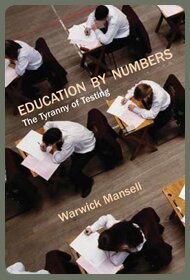Thursday, August 27th
Do today’s GCSE results, which show another improvement to a new record, amount to testimony that our students and teachers are working harder than ever before and that education standards are rising, or that the papers are getting easier?
It is the routine question at this time of year. And the honest answer is that there is no answer. The statistics, the principal means by which the Government is supposedly being held to account for its education performance, provide no good way of answering the question as to whether underlying standards of teaching and learning are rising or falling.
Put together with immense care and technical expertise by exam board professionals who are among the most sophisticated in the world at this business, the stats do a pretty good job of sorting out the A grade student from the C grade, and the C grade from the F grade.
But they cannot tell us whether education standards are rising or falling. Why not? Because too much about the exams system has changed over the years. As some experts in this field say: “If you want to measure standards, don’t change the measure.”
Among the alterations in the past five years have been the scrapping of compulsory language study to 16 – which might have been expected to improve grades, as pupils utilise more choice over which subjects they study – a move towards more modular courses, and, as today’s figures show, increased “gaming” of the system by schools in encouraging pupils to take subjects including maths early, with the chance to resit later on in the course.
As Mike Cresswell, the director general of the AQA board who led the GCSE results press conference this morning, argued in a paper a few years ago, “The statistics of public examinations cannot, and do not, provide objective or unequivocal quantitative measures of temporal changes in educational standards.”
You could say, then, that it is a mistake even to attempt to answer the question with which this blog began. This could be argued to be true particularly because curricula changes mean that the content of what is learnt in schools from one era to the next is not strictly comparable. And shouldn’t we just stand back at this time of year and allow the students to receive their grades in peace?
This is, however, never going to happen so long as the Government makes the grades themselves a judgement not only of what pupils have gained from their education, but of its own performance. To put out national figures at the same time that students receive their results and then ask the media just simply to go along with Government claims that they are unequivocal testament to rising standards is to ask the media not to do its job.
If those in charge were really committed to addressing claims that this debate undermines pupils’ achievements, they could do two things. First, they could move the publication of national results until some weeks after students had got their grades, which might separate the argument about national standards from the time when teenagers are given their verdicts. Or second, and much the better long-term solution, they could depoliticise this debate by introducing another measure of national education standards, such as getting a small sample of pupils to be assessed every year outside of the GCSE and A-level system.
That second approach go a long way to stopping the production of ever-rising GCSE and A-level grades as being seen as an end in itself, to be aimed for whatever the means taken to achieve them. The system by which ministers set themselves targets, then watch as league tables, performance management and the Ofsted, school improvement partner and Fischer Family Trust regime of statistically-driven bullying all put huge pressure on schools to help them meet them, is hugely damaging to education, with very few powerful people in this regime asking what the results really mean, and the measures being taken to raise them.
The side-effects, of course, are legion, as my book and this website has attempted to document. The most obvious, now, is that the last four years of most students’ lives at school could be seen as one long exercise in exam preparation, as they go through module after module of GCSEs and A-levels. Modularisation, to use a horrible word, may be the right way to go in educational terms – I am to some extent agnostic on it. But it has developed to the degree it has because it seen to be more likely to produce good grades, whatever they mean, and whatever the educational side-effects. It is true that some within the exam boards are concerned about this trend. But anyone trying to resist it is facing an uphill battle, given the pressures on schools over results.
This is particularly unfortunate because not only are the results not useful as a measure of underlying education standards, the grades drive may not even, in its own right, help students, since raising scores may just mean that employers and universities simply increase the grades they demand of new recruits.
Neither does the advent of the results-are-everything culture seem to have achieved much in terms of improving social mobility: while the proportion of A grades for pupils from comprehensives has improved at both GCSE and A-level in recent years, the rate has improved by at least as much in private schools, from a higher base.
Students should not be too depressed today. Good grades still reflect hard work. But this emphasis on grades as ends in themselves, for the nation as a whole, is a grave national mistake.
- Warwick Mansell
No Comments
posted on August 27th, 2009
